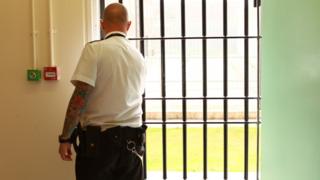
Almost 200 sex offenders were released from prison in England and Wales in one year without having anywhere to live, Ministry of Justice (MoJ) figures show.
More than 100 of them were classed as posing a "high" or "very high" risk to the public.
Probation inspectors have warned that freed prisoners who sleep rough are more likely to commit further crimes.
The Probation Service said it worked closely with local councils to help those leaving prison.
The figures, for England and Wales in 2018-19, were supplied by the MoJ under the Freedom of Information Act.
They show that on 68 occasions "high and very high risk" sex offenders, who were on licence for more than six months, had no accommodation on release.
A further 53 homelessness cases involved "high risk" sex offenders with a licence period of more than 12 months, and 70 involved "medium risk" sex offenders with more than six months on licence.
Earlier this month, the chief inspector of probation, Justin Russell, criticised the lack of a "cross-government" approach to housing offenders, pointing out that prisoners with no settled accommodation were almost twice as likely to be sent back to jail within 12 months of release.
In an inspection report, he blamed the problem on:
housing shortages high up-front rental costs low-priority on housing registers lack of support services benefit delays "providers averse to accommodating people with substantial criminal records"Mr Russell said: "We were particularly disturbed by the high numbers of higher-risk prisoners being released into homelessness or unsettled accommodation."
The report found that in 2018-19 at least 22% of prisoners presenting the highest risk to the public were homeless or had nowhere stable to stay, amounting to 6,515 individuals.
In total, there were 11,435 occasions when prisoners were homeless when they were let out - 16% of released male offenders and 18% of female inmates.
Public protection 'priority'
The Probation Service, which is part of the MoJ, said the figures for sex offenders showed accommodation on the day of release and did not necessarily mean they "remained homeless afterwards".
It says it has introduced new teams dedicated to finding housing, and is increasing places in "approved premises", also known as "bail hostels" or "probation hostels".
It adds that it has helped "hundreds of offenders" stay off the streets as part of the Government's Rough Sleeping Strategy.
A spokesperson said: "Public protection is our number one priority. Sex offenders on licence must report regularly to their probation officer and abide by strict conditions which if breached can see them go back to prison."
During the coronavirus lockdown, BBC News discovered that 142 prisoners were put up in hotels and bed and breakfast accommodation to limit the spread of Covid-19.

 5 years ago
524
5 years ago
524 

